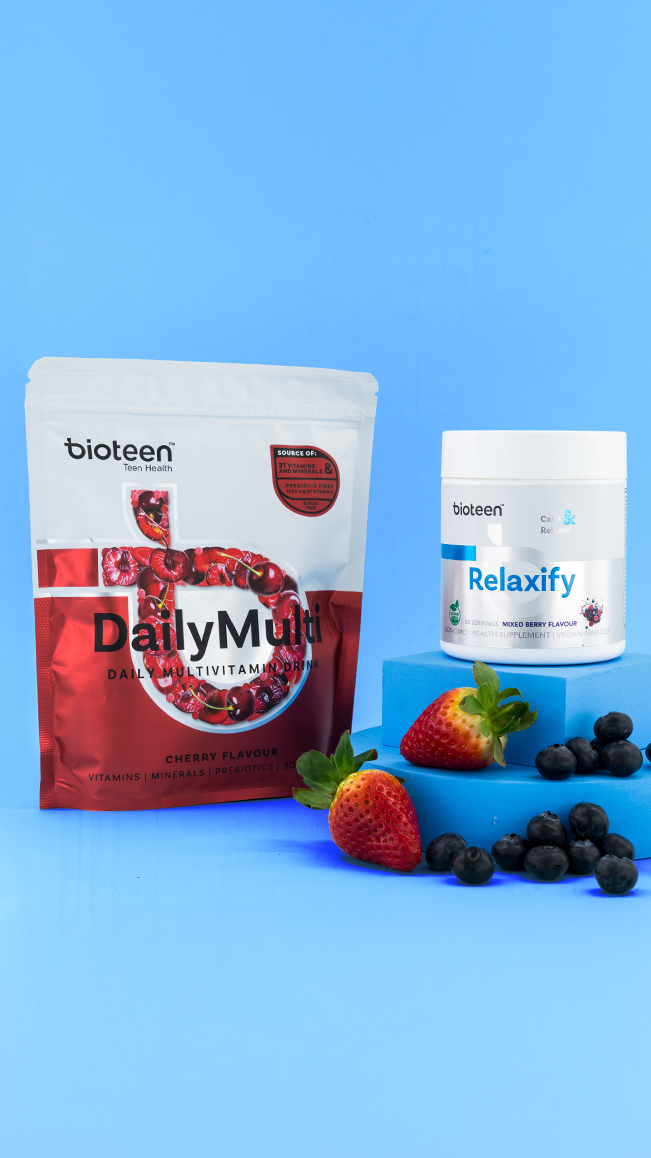
Top 5 Reasons Why Gut Health is Important
What Is Gut Health
The gut is a really hot topic at the moment, and for good reason. As researchers discover more, it becomes increasingly interesting and slowly but surely they are uncovering that virtually all the systems of the body are impacted by its health. This is actually great news, because this potentially means that what we eat and what additional nutrients we put into our body can have even more far reaching effects than we previously thought. It goes without saying, that the earlier you can improve gut health, the better the outcomes and this is why gut health is something that even teens should focus on.
The gut can also act as a ‘brain’
In recent years, the gut has famously been called the ‘second brain’. This is because just as your brain is made up of neurons that communicate with one another through neurotransmitters, the enteric nervous system (which extends all along the entire digestive tract) has a similar composition. Because their structure is similar, they are able to communicate with one another, either chemically (through the neurotransmitters) or physically (through the vagus nerve). This communication is bidirectional, meaning it goes both ways and is known as the gut-brain axis (GBA). This is one of the reasons why when you are stressed (or have a psychological response) you may have an urge to go to the toilet (which is a physiological response) and why a disproportionate amount of people with functional bowel problems like irritable bowel syndrome (or IBS) also often suffer from anxiety and depression.
What we consume affects the gut-brain axis
Your gut microbiome, which is the huge population of bacteria that live in the gut, plays an important role in these communication channels. Since we know what we consume affects the density and diversity of the microbes that live in our gut microbiome, it makes sense that tweaking the diet, through changing your diet or taking pre and probiotics, can have an effect on the way that the gut and brain communicate. New research has reinforced this thought, showing us how the gut microbiome has the ability to stimulate neural pathways and affect central nervous system signaling (1).
One of the microbiota’s primary functions is to ferment non-digestible carbohydrates (like fibre, resistant starches, pectins, gums and cellulose) and in return produce short chain fatty acids (SCFA). The amount of SCFAs produced depends on the composition of the microbiota as well as the amount of prebiotics in the diet, which mainly comes from plant based foods including fruits, vegetables, wholegrains and legumes. Low fibre starches like refined grains and sugar are primarily absorbed in the small intestine, meaning that very little is left over for the microbiota to feast on (2).
Why should we care about SCFA?
SCFA are very special because they can have a number of beneficial effects on the body. When it comes to managing your mood, they are able to pass through the blood brain barrier (BBB) into the CNS where they exert neuroactive properties which can in turn influence mood and mood disorders, like anxiety and depression (3). If your diet is low in non-digestible carbohydrates (i.e. it is high in protein and/ or fats) end products like nitrosamines and secondary bile acids are produced. These end products may increase levels of oxidative stress and inflammation, which can increase your risk for disease down the line. So having a diet rich in fiber is key to good health in general, including mood, immune and weight support.
Mood improvements
One of the ways that the gut microbiome can improve mood is through modulating neurotransmitters (which are chemical signalling molecules) that allow neurons in the brain and the gut to communicate with each other. The amounts of types of these neurotransmitters created can affect how a person feels and behaves. SCFAs may change the levels of certain neurotransmitters. For example, acetate changes the levels of GABA (which is an inhibitory neurotransmitter, which relaxes you) while propionate and butyrate regulate the expression of tryptophan 5-hydroxylase 1 which is the enzyme involved in the synthesis of serotonin (our happy hormone) as well as tyrosine hydroxylase which is needed to produce dopamine (or our reward seeking neurotransmitter) (4,5). In short, when the gut microbiome makes enough SCFA these will have an effect on how relaxed and happy you feel.
Immune support
SCFAs also have the ability to strengthen the physical gut lining, this is important because the physical gut lining is what protects a person from any dangerous microbes that they may have swallowed (either in their food or drink, or simply the microbes that they pick up on their hands). You obviously don’t want these microbes to have access to the bloodstream (where they can make you sick) and so by having a strong gut lining, you are able to keep them out. In addition to this, just like the microbes are able to communicate with the brain, they are also able to communicate with the gut associated lymphoid tissue (or GALT). This communication allows the GALT to mount an appropriate immune response (not too little, but also not too much). The gut microbiome can also interact with cytokines, which means that it can influence inflammation levels, upregulating anti-inflammatory pathways while down regulating inflammatory ones (6). Some bacterial species even have the ability to suppress pathogens! So having the right kinds of bacteria in your microbiome is one of the ways that you can keep your immune system in check.
Weight management
Although there are many more benefits related to good gut health, one that is definitely worth mentioning is the link between the microbiome and weight management. It appears that the bacterial profile of people who are overweight is different from their lean counterparts both in quality and quantity. The question we need to ask is: ‘Are people overweight because of the bacteria in their gut or are the bacteria in their gut different because they are overweight?’ It is a bit of a chicken and egg conundrum. Interestingly when people do lose weight, their bacterial composition does start to look more like that of the lean individuals. More and more research is being done in this area and it is only a matter of time before we know more (7).
Skin health
Numerous studies indicate that the gut microbiome’s influence extends well beyond the digestive system and the nervous system. There is increasing recognition for the gut-skin axis. Dysregulation of microbiota has been seen in numerous inflammatory skin conditions such as atopic dermatitis, rosacea, and psoriasis (8).
The bottom line
Gut health is important for many more reasons than being able to go to the toilet successfully every day. It is clear that the types of foods and supplements that we use can have a profound effect on our microbiome and in turn the end products that they produce. All together they can have an impact on not only your moods and emotions but also your immune system and possibly even your weight. These are all areas of concern for many teenagers, and so by looking after their gut health we may be able to cultivate long term health benefits that will have long lasting effects.
References
1. Carabotti M, Scirocco A, Maselli MA, Severi C. The gut-brain axis: interactions between enteric microbiota, central and enteric nervous systems. Ann Gastroenterol. 2015 Apr-Jun;28(2):203-209.
2. Cox L, Weiner H. Microbiota Signaling Pathways that Influence Neurologic Disease. Neurotherapeutics. 2018;15(1):135-145.
3. Ratajczak W, Rył A, Mizerski A, Walczakiewicz K, Sipak O, Laszczyńska M. Immunomodulatory potential of gut microbiome-derived short-chain fatty acids (SCFAs). Acta Biochimica Polonica. 2019.
4. Silva Y, Bernardi A, Frozza R. The Role of Short-Chain Fatty Acids From Gut Microbiota in Gut-Brain Communication. Frontiers in Endocrinology. 2020;11.
5. Mohammadi AA, Jazayeri S, Khosravi-Darani K, Solati Z, Mohammadpour N, Asemi Z, et al. The effects of probiotics on mental health and hypothalamic-pituitary-adrenal axis: a randomized, double-blind, placebo-controlled trial in petrochemical workers. Nutr Neurosci. 2016 Nov;19(9):387-95.
6. Ratajczak W, Rył A, Mizerski A, Walczakiewicz K, Sipak O, Laszczyńska M. Immunomodulatory potential of gut microbiome-derived short-chain fatty acids (SCFAs). Acta Biochimica Polonica. 2019.
7. Aoun A, Darwish F, Hamod N. The Influence of the Gut Microbiome on Obesity in Adults and the Role of Probiotics, Prebiotics, and Synbiotics for Weight Loss. Prev Nutr Food Sci. 2020;25(2):113-123.
8. Thye AY, Bah YR, Law JW, Tan LT, He YW, Wong SH, Thurairajasingam S, Chan KG, Lee LH, Letchumanan V. Gut-Skin Axis: Unravelling the Connection between the Gut Microbiome and Psoriasis. Biomedicines. 2022 Apr 30;10(5):1037.












